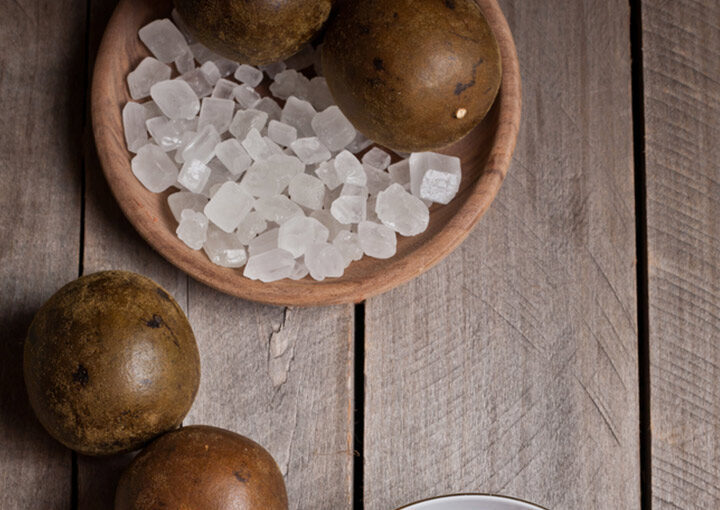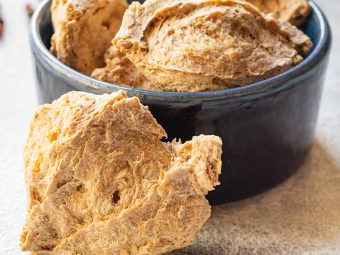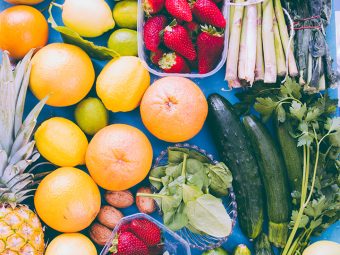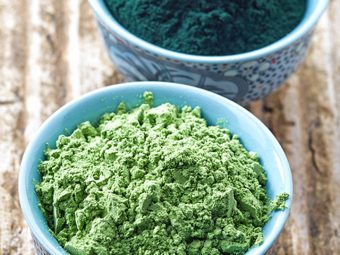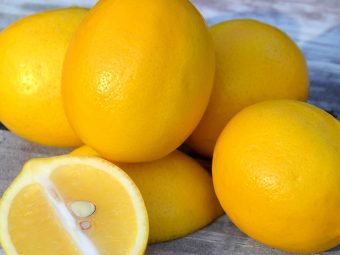[ad_1]
When it comes to healthy diet options, picking fruits is a no-brainer. You might have also heard about a few superfoods packed with numerous health benefits. For example, monk fruit is a versatile fruit that has rapidly become popular among health-conscious consumers.
Famous for its intense sweetness, monk fruit can be a healthy solution for your sugar cravings and hunger pangs. Since this sweetness is almost harmless, monk fruit sugar has become a savior for fitness folks and people with insulin resistancei XThe inability of cells to respond to insulin hormones that leads to elevated blood sugar levels or diabetes. .
Let’s explore more about the qualities of this ordinary-looking gem of a fruit.
What Is Monk Fruit?
Monk fruit is brownish-yellow melon-like fruit with a smooth outer covering and a diameter of up to 4-7 cm.
Traditionally known as lo han guo, monk fruit grows on a herbaceous vine that predominantly grows in southern China’s Guangxi province. It takes its name after the Chinese monks who grew it centuries ago (1).
StyleCraze Trivia
Recently, monk fruit has been marking its unrivaled presence in the health and wellness market.
Read more to understand what makes monk fruit so popular.
Is Monk Fruit Healthy?
Raw monk fruit is a rich source of vitamins, antioxidants, and dietary fibers, which are otherwise under-consumed. It is traditionally used as a remedy for lung problems, treating sunstroke, dehydration, bowel discomfort, throat problems, coughs, and colds. The fruit also has various bioactive compounds, which are very good for health (1).
Owing to its many benefits, monk fruit extracts are widely used to make natural sweeteners.
What Is Monk Fruit Sweetener?
Monk fruit sweetener is a concentrated form of the dried fruit extracts and is 300 times sweeter than sugar (1).
It is prepared from the fruit’s dried extracts in three steps:
- The fruit is crushed to extract the juice.
- The juice is mixed with hot water and filtered to prepare an infusion.
- The infusion is then dried and powdered to prepare monk fruit sugar.
Monk fruit sweetener contains zero calories and carbohydrates (2). Let’s take a look at its nutritional profile.
Monk Fruit: Nutrition Facts And Glycemic Index (GI)
Monk fruit sweetener has zero glycemic index; therefore, it does not increase blood sugar levels. Fresh monk fruit contains the following nutrients (1):
| Nutrients | Presence By Percentage/Weight |
|---|---|
| Fat | 0.8% |
| Fructose | 1.5% |
| Protein | 7.1-7.7% |
| Total sugar | 24.17% – 3731% |
| Glucose | 0.8% |
| Reducing sugar | 16.12-31.4% |
| Polysaccharides | 2.87-5.64% |
| Thiamine (Vitamin B1) | 337 mg/100 g |
| Riboflavin (Vitamin B2) | 123 mg/100 g |
| Ascorbic acid (Vitamin C) | 340-462 mg/100 g |
Monk fruit products are believed to be a healthy alternative to simple sugar when trying to lose weight and manage metabolic health. Monk fruit and its sweeteners are accepted as GRAS (Generally Recognised as Safe) food by FDA (3). Due to its excellent nutritional qualities, monk fruit may benefit your health in many ways.
Health Benefits Of Monk Fruit And Its Sweetener
1. May Help In Weight Loss
Studies conducted on mice found that monk fruit extracts could promote weight loss. The fruit contains bioactive compounds like mogrosides, especially mogroside IV and V, which inhibit the production of lipase (digestive enzyme) in the pancreas. This suppresses appetite, increases satiety, and may help in weight management. The oral intake of mogrosides may also reduce triglycerides and total cholesterol levels (1). However, further trials on humans are required to substantiate the claims.
2. May Reduce Inflammation
Monk fruit may reduce oxidative stress in the body and prevent inflammation. An animal study showed that the mogroside V found in monk fruit may alleviate the inflammatory response of porcine alveolar macrophages (a type of white blood cell) (1), (4). Therefore, it may have a protective effect and help manage the symptoms of inflammatory conditions. However, further research is required to conclude its efficacy in humans.
3. May Maintain Sugar Levels
Monk fruit may have anti-diabetic effects by enhancing the rate of blood glucose uptake The mogrosides in the fruit has free radical scavenging properties and may reduce oxidative stress, which is one of the factors responsible for diabetes (1). A study on rats also found that monk fruit has anti-hyperglycemici XThe agents with anti-hyperglycemic properties counter the accumulation of excess glucose in the blood. and anti-hyperlipidemici XThe agents with anti-hyperlipidemic properties help reduce bad cholesterol and may also increase good cholesterol. properties and could help control blood sugar levels and improve lipid profile (5). However, further human studies are required to substantiate the claims.
All these health benefits may make you switch to monk fruit sweeteners immediately. While you may use monk fruit sweetener to balance your meals with other carbs without the sugar overload, it is essential to watch out for possible side effects.
Side Effects Of Monk Fruit
While monk fruit is considered safe to consume, it might cause allergic reactions. The symptoms may include:
- Rashes
- Breathing issues
- Irregular heartbeat,
- Dizziness
- Swollen tongue
- Abdominal pain
- Wheezing
Monk fruit sweeteners may contain erythritol, another sugar substitute, which may also cause allergic reactions (6). In case you experience any side effects, discontinue using monk fruit sweetener and consult a doctor immediately.
Also, the products containing monk fruit sweeteners may still have added calories. It is advised to check the labels for GI and calorific values of the monk fruit product, as they may differ across the brands. The following sections cover everything you need to know about monk fruit sugar’s impact on blood sugar levels.
Does Monk Fruit Raise Blood Sugar?
No. Monk fruit does not raise blood sugar levels. The extracts get their iconic sweetness from mogrosides compounds, which aren’t absorbed by the body and get excreted with the urine (7). Thus, they do not add calories or raise blood sugar levels.
Wondering if it is safe to consume if you have diabetes? Let us find out.
Is Monk Fruit Suitable For People With Diabetes?
Due to its intense level of sweetness, low calorific value, and zero glycemic index, monk fruit extracts could be an ideal replacement for sugar for people with diabetes and obesity (8).
Although the FDA did not specify an acceptable daily intake (ADI), it recognizes monk fruit sweeteners as safe for people with diabetes (9). Moreover, the compound erythritol used in these sweeteners is observed to improve glucose tolerance in mice (10).
Monk fruit and its extracts can be included in your diet in various ways.
How To Eat Monk Fruit
Monk fruit has a short shelf life in its raw form. It turns rancid within a few days. You may find it available in dried form, which you can use to prepare:
- Tea
- Juice, smoothies, etc.
- Salad seasoning
- Ice cream and yogurt
- Mousse and frostings
- Porridge, pudding, and oatmeal
You can add monk fruit sugar and sweetener to your foods and beverages.
Is your mouth already watering? Then, it is time to dig into some delicious monk fruit recipes.
3 Easy Monk Fruit Recipes
Cooking or baking with monk fruit sweetener is easy as it holds high temperatures very well and mixes well with other ingredients. Here are 3 easy-to-prepare recipes with monk fruit.
1. Peanut Butter Cookie
You Will Need
- 100 grams natural peanut butter
- Monk fruit sugar
- 2 Eggs
Method
- Mix the eggs, monk fruit sugar, and peanut butter in a bowl.
- Make small dough balls and place them on parchment paper.
- Press each ball into a flat textured cookie with a fork.
- Bake them for 10-12 minutes at 300°F, and your cookies are ready!
2. Monk Fruit Tea
You Will Need
- 1 dried monk fruit
- 1 ½ liter of water
Method
- Break the shell of the dried monk fruit and extract the insides.
- Add the monk fruit pieces to the boiling water.
- Brew for 5 minutes, strain the liquid, and serve hot.
3. Coconut And Monk Fruit Balls
You Will Need
- 2 egg whites
- 1 ½ teaspoons of cornstarch
- 50 grams monk fruit sweetener
- 140 grams dried desiccated coconut
Method
- Mix the egg whites with cornstarch.
- Add monk fruit sweetener and desiccated coconut to the mix.
- Whisk all the ingredients in a bowl with a spatula.
- Create small dough with a spoon and bake in the oven at 300°F until golden outside.
- Let them cool on the baking tray.
- Your snack is ready!
Final Thoughts
Monk fruit is a Southern Chinese fruit globally exported to make nonnutritive sweeteners. It is a suitable alternative for people with diabetes and those trying to limit their sugar intake. Monk fruit sweeteners may also help reduce oxidative stress, which is one of the major factors responsible for inflammatory and metabolic conditions. Though monk fruit extracts and their sweeteners can be safely added to your daily diet, they may also trigger allergic reactions. Therefore, check the labels before purchasing monk fruit sweeteners and consult a doctor before completely switching to this sugar substitute.
Frequently Asked Questions
Does monk fruit affect the pancreas?
No. It does not affect the pancreas. However, it may help prevent the proliferation of pancreatic cancer cells (11).
Is monk fruit or stevia better?
Both monk fruit and stevia are plant-based artificial sweeteners with the same purpose – to treat taste buds with sweetness minus the calorie load. Try both to check out which one you like the most. You can even have the best of both worlds occasionally.
Is monk fruit hard on the stomach?
No. Monk fruit is not hard on the stomach. Traditionally monk fruit is used to combat gut-related disorders. Monk fruit sweetener is also harmless for the gut but may experience discomfort if allergic to it.
Does monk fruit cause gas?
No. Monk fruit does not cause gas, bloating, or other abdominal issues.
Key Takeaways
- Monk fruit has zero GI value and is a healthy option for people trying to avoid calories.
- Monk fruit sweetener may help in weight loss, does not increase blood sugar, and thus improve BMI and glucose tolerance.
- It might be suitable for people with diabetes and weight issues.
- It is beneficial to consult an expert before making significant dietary changes.
Sources
Articles on StyleCraze are backed by verified information from peer-reviewed and academic research papers, reputed organizations, research institutions, and medical associations to ensure accuracy and relevance. Read our editorial policy to learn more.
- Monk fruit (Siraitia grosvenorii) – health aspects and food applications
https://www.researchgate.net/publication/339106844_Monk_fruit_Siraitia_grosvenorii_-_health_aspects_and_food_applications - Monk fruit (Siraitiagrosvenorii): An emerging natural low-calorie sugar substitute
https://www.researchgate.net/publication/340050924_Monk_fruit_Siraitiagrosvenorii_An_emerging_natural_low-calorie_sugar_substitute - Determination of the Generally Recognised as Safe (GRAS) status of sirajtia grosvenor/swingle (luo han guo) fruit extract as a food ingredient
https://www.fda.gov/media/109982/download - Mogroside V exerts anti-inflammatory effects on fine particulate matter-induced inflammation in porcine alveolar macrophages
https://pubmed.ncbi.nlm.nih.gov/35134483/ - Anti-hyperglycemic and anti-hyperlipidemic effects of a special fraction of Luohanguo extract on obese T2DM rats
https://pubmed.ncbi.nlm.nih.gov/31586692/ - The First Case of Erythritol-Induced Anaphylaxis in Korea
https://www.ncbi.nlm.nih.gov/pmc/articles/PMC8921212/ - Comparative In vitro metabolism of purified mogrosides derived from monk fruit extracts
https://www.sciencedirect.com/science/article/abs/pii/S0273230020302828 - Potential Applications of Monk Fruit As a Sweetener in Different Food Products
https://www.krishiscience.in/storage/app/finalpdf/LP1iLudLPoJa8nWrLFcEB5dYSUT8KvLEwlYz2xwG.pdf - Additional Information about High-Intensity Sweeteners Permitted for Use in Food in the United States FDA
https://www.fda.gov/food/food-additives-petitions/additional-information-about-high-intensity-sweeteners-permitted-use-food-united-states - Erythritol Ameliorates Small Intestinal Inflammation Induced by High-Fat Diets and Improves Glucose Tolerance
https://www.ncbi.nlm.nih.gov/pmc/articles/PMC8197374/ - Mogroside V a Compound of Monk Fruit Inhibits Pancreatic Cancer Cell Proliferation and Promotes Tumor Apoptosis In Vivo and In Vitro
https://www.herbalgram.org/resources/herbclip/issues/bin_548/061631-548/
Related
LATEST ARTICLES
[ad_2]





